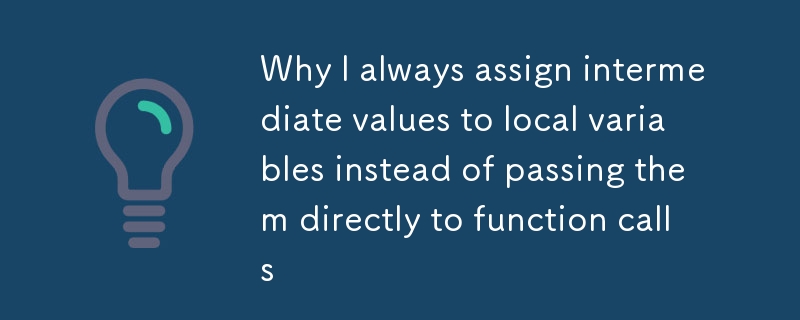Why I always assign intermediate values to local variables instead of passing them directly to function calls
来源:dev.to
时间:2024-09-27 14:52:05 470浏览 收藏
从现在开始,我们要努力学习啦!今天我给大家带来《Why I always assign intermediate values to local variables instead of passing them directly to function calls》,感兴趣的朋友请继续看下去吧!下文中的内容我们主要会涉及到等等知识点,如果在阅读本文过程中有遇到不清楚的地方,欢迎留言呀!我们一起讨论,一起学习!

而不是
def do_something(a, b, c):
return res_fn(
fn(a, b),
fn(b),
c
)
我愿意:
def do_something(a, b, c):
inter_1 = fn(a, b)
inter_2 = fn(b)
result = res_fn(inter_1, inter_2, c)
return result
第一个版本要短得多,如果格式正确,同样具有可读性。
但我更喜欢第二种方法的原因是因为所有中间步骤都保存到局部变量中。
像sentry这样的异常跟踪工具,甚至是设置debug=true时弹出的django错误页面,都会捕获本地上下文。最重要的是,如果您必须使用调试器单步执行该函数,您可以在单步执行该函数之前看到确切的返回值。这就是为什么我什至在返回最终结果之前将其保存在局部变量中的原因。
以几个额外的变量赋值和几行额外的代码为代价,这使得调试变得更加容易。
好了,本文到此结束,带大家了解了《Why I always assign intermediate values to local variables instead of passing them directly to function calls》,希望本文对你有所帮助!关注golang学习网公众号,给大家分享更多文章知识!
声明:本文转载于:dev.to 如有侵犯,请联系study_golang@163.com删除
相关阅读
更多>
-
501 收藏
-
501 收藏
-
501 收藏
-
501 收藏
-
501 收藏
最新阅读
更多>
-
376 收藏
-
316 收藏
-
424 收藏
-
442 收藏
-
295 收藏
-
434 收藏
-
486 收藏
-
285 收藏
-
222 收藏
-
183 收藏
-
201 收藏
-
424 收藏
课程推荐
更多>
-

- 前端进阶之JavaScript设计模式
- 设计模式是开发人员在软件开发过程中面临一般问题时的解决方案,代表了最佳的实践。本课程的主打内容包括JS常见设计模式以及具体应用场景,打造一站式知识长龙服务,适合有JS基础的同学学习。
- 立即学习 543次学习
-

- GO语言核心编程课程
- 本课程采用真实案例,全面具体可落地,从理论到实践,一步一步将GO核心编程技术、编程思想、底层实现融会贯通,使学习者贴近时代脉搏,做IT互联网时代的弄潮儿。
- 立即学习 516次学习
-

- 简单聊聊mysql8与网络通信
- 如有问题加微信:Le-studyg;在课程中,我们将首先介绍MySQL8的新特性,包括性能优化、安全增强、新数据类型等,帮助学生快速熟悉MySQL8的最新功能。接着,我们将深入解析MySQL的网络通信机制,包括协议、连接管理、数据传输等,让
- 立即学习 500次学习
-

- JavaScript正则表达式基础与实战
- 在任何一门编程语言中,正则表达式,都是一项重要的知识,它提供了高效的字符串匹配与捕获机制,可以极大的简化程序设计。
- 立即学习 487次学习
-

- 从零制作响应式网站—Grid布局
- 本系列教程将展示从零制作一个假想的网络科技公司官网,分为导航,轮播,关于我们,成功案例,服务流程,团队介绍,数据部分,公司动态,底部信息等内容区块。网站整体采用CSSGrid布局,支持响应式,有流畅过渡和展现动画。
- 立即学习 485次学习

